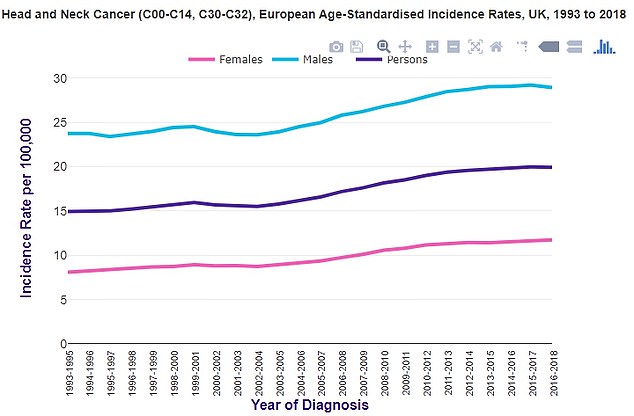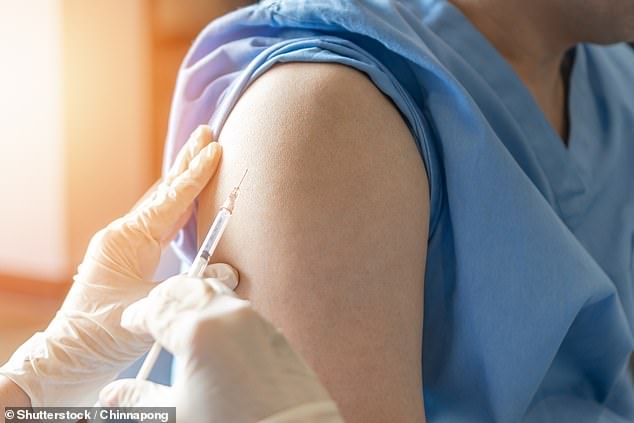The UK and the US are experiencing an ‘epidemic’ of throat cancer, with more people being diagnosed each year.
But doctors don’t just blame smoking – they also believe oral sex could be to blame.
This comes as Heart Radio presenter Jamie Theakston, 53, revealed he has stage one laryngeal cancer after listeners noticed there was something not quite right with his voice.
There are around 12,800 new head and neck cancers each year in the UK and around 71,100 in the US.
Since the early 1990s, cancer incidence rates have risen by more than a third (35 per cent) in the UK, Cancer Research says.
Doctors say the human papillomavirus (HPV), a normally harmless virus transmitted sexually and through skin-to-skin contact, could be responsible for the increase.
Jamie Theakston revealed he has cancer on Tuesday and said he will take a break from his work on Heart Radio while his co-star Amanda Holden gave a health update.

Doctors say the human papillomavirus (HPV), a normally harmless virus transmitted sexually and through skin-to-skin contact, could be behind the rise in head and neck cancers.

Pop star Katie Perry recently admitted to the crime. The ‘Firework’ singer told the ‘Call Her Daddy’ podcast: ‘If I come downstairs and the kitchen is clean, and you’ve done everything, and you’ve done all the dishes, and you’ve locked all the pantry doors, you better be ready to get your dick sucked.’
Dr Hisham Mehanna, from the University of Birmingham in the UK, said 70 per cent of throat cancer cases are caused by HPV, which has been linked to multiple forms of cancer.
He said people with multiple oral sex partners have up to a nine-fold increased risk of throat cancer.
He wrote in The conversation that there has been a “rapid rise in throat cancer in the West” to the point that some have called it “an epidemic.”
Oropharyngeal cancer is the most common type of throat cancer. It occurs in the tonsils and the back of the throat.
According to Macmillan, HPV is linked to some cases of oropharyngeal cancer, but the virus is very common and most people who have it will not develop cancer.
A swelling or lump in the neck, sore throat, earache, voice changes, and uneven-looking tonsils are telltale signs of the disease.

These data show that throat cancer cases have been trending upward in the UK, as they have in the US.

Contracting the virus has been shown to increase the risk of several types of cancer, including cervical, oral, anal, penile and vaginal cancer.

The HPV vaccine, offered to all 12- and 13-year-old schoolchildren, more than halved head and neck cancer rates, a new study finds
Doctors have found that oral sex is the biggest risk factor for this type of cancer, surpassing smoking, alcohol consumption and an unhealthy diet.
This is because these acts can cause an HPV infection in the back of the throat or near the tonsils.
HPV is a common virus that is transmitted through vaginal, anal, and oral sex with someone who is already infected.
Although these infections go away on their own in most cases, they can sometimes persist and cause cancer.
Research shows that the vast majority (85.4%) and women (83.2%) practice oral sex during intimacy.
Pop star Katie Perry recently admitted to the crime. The ‘Firework’ singer told the ‘Call Her Daddy’ podcast: ‘If I come downstairs and the kitchen is clean, and you’ve done everything, and you’ve done all the dishes, and you’ve locked all the pantry doors, you better be ready to get your dick sucked.’
HPV has been shown to increase the risk of several types of cancer, including cervical, oral, anal, penile, and vaginal cancer.
There is an HPV vaccine, which is more than 80 percent effective and is available in much of the developed world.
It is a two-dose vaccine for children between 11 and 12 years old. The injections are administered 12 months apart.
For people who missed that window, a three-dose vaccine is available for people ages 15 to 26.
The vaccine has been offered to girls in England and Wales since September 2008, before being expanded to include boys in 2019.
But the vaccine not only helps prevent cervical cancer: it has also been shown to be effective in reducing rates of head and neck cancer.
Rates have dropped from 6.3 cases to 2.8 cases per 100,000 men, according to a study involving more than 5 million men and women in the United States.
Commenting on the news that presenter Jamie Theakston has been diagnosed with stage one laryngeal cancer after fans spotted a change in his voice, NHS England’s national clinical director for cancer Professor Peter Johnson said: “While any cancer diagnosis is disheartening, it’s really positive that Jamie’s was caught early.
‘Talking about cancer and how to spot the signs and symptoms helps save lives, as detecting cancer early gives people the best chance of successful treatment.
‘One in two of us will develop some form of cancer in our lifetime, but thanks to continued progress, more cancers are now being diagnosed at an early stage than ever before and survival rates are at an all-time high, so I would encourage anyone to visit their GP if they have worrying symptoms and to make screening appointments when they do get them.’

